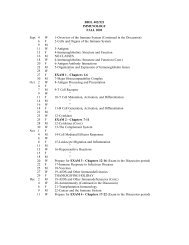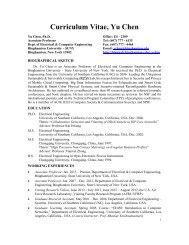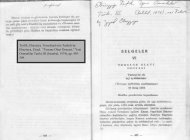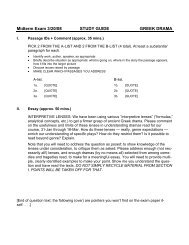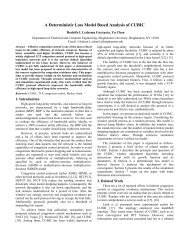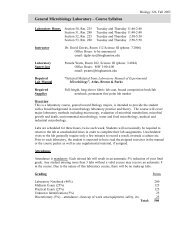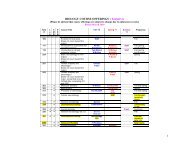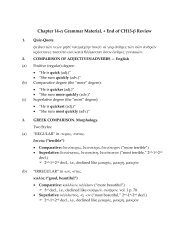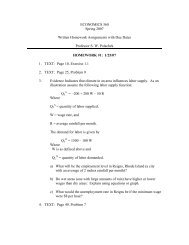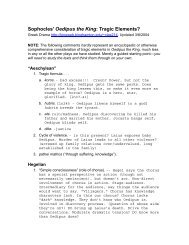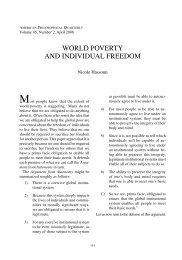Aristotle Poetics - Harvey.binghamton.edu
Aristotle Poetics - Harvey.binghamton.edu
Aristotle Poetics - Harvey.binghamton.edu
You also want an ePaper? Increase the reach of your titles
YUMPU automatically turns print PDFs into web optimized ePapers that Google loves.
<strong>Aristotle</strong> <strong>Poetics</strong> 5<br />
of rhythms—it was through their original aptitude, and by a series of improvements for<br />
the most part gradual on their first efforts, that they created poetry out of their improvisations.<br />
10<br />
20<br />
Poetry, however, soon broke up into two kinds according to the differences of temperament<br />
in the individual poets; for the graver among them would represent noble actions,<br />
and those of noble characters; and the meaner sort the actions of the ignoble. The latter<br />
class produced invectives at first, just as others did hymns and praise-poems. We know of<br />
no such poem by any of the pre-Homeric poets, though there were probably many such<br />
writers among them; instances, however, may be found from Homer downwards, for instance<br />
his Margites, 25 and the similar poems of others. In this poetry of invective its natural<br />
fitness brought an iambic meter into use; hence our present term “iambic,” because it<br />
was the meter of their “iambs” or invectives against one another. 26 The result was that the<br />
old poets became some of them writers of heroic 27 and others of iambic verse. Homer’s<br />
position, however, is peculiar: just as he was in the serious style the poet of poets, standing<br />
alone not only through the literary excellence, but also through the dramatic nature of<br />
his imitations, so too he was the first to outline for us the general forms of comedy by<br />
producing not a dramatic invective, but a dramatic picture of the ridiculous; his Margites<br />
in fact stands in the same relation to our comedies as the Iliad and Odyssey to our tragedies.<br />
As soon, however, as tragedy and comedy appeared in the field, those naturally<br />
drawn to the one line of poetry became writers of comedies instead of iambs, and those<br />
naturally drawn to the other, writers of tragedies instead of epics, because these new<br />
modes of art were grander and of more esteem than the old.<br />
If it be asked whether tragedy is now all that it need be in its formative elements, to consider<br />
that, and decide it theoretically and in relation to the theaters, is a matter for another<br />
inquiry. 28<br />
It certainly began in improvisations—as did also comedy, tragedy originating with the<br />
authors of the dithyramb, comedy with those of the phallic songs, which still survive as<br />
institutions in many of our cities. 29 And its advance after that was little by little, through<br />
their improving on whatever they had before them at each stage. 30 It was in fact only after<br />
25 Margites: a poem, of which only fragments survive, in mixed meters (hexameter,<br />
iambic), specializing in broad humor (an idiotic and sexually inept hero). <strong>Aristotle</strong> ascribes<br />
the poem to Homer, and regards it as a kind of proto-comedy. In a sense, then,<br />
Homer is the “father” of both tragedy and comedy.<br />
26 Iambic meter (i.e., using the repeating pattern ta-DAH; compare above, note 8) at<br />
first was mostly used for humorous or abusive poetry; later for more serious poetry.<br />
27 He means epic.<br />
28 <strong>Aristotle</strong> will now address the historical development of comedy and tragedy.<br />
29 Phallic songs were songs sung accompanying an oversized phallos (representation<br />
of the male member) carried in parades honoring Dionysus, god of fertility and revelry.<br />
<strong>Aristotle</strong> views phallic songs as the origin of comedy, just as he views tragedy as<br />
originating from primitive dithyramb (see above, note 4).<br />
30 <strong>Aristotle</strong> produces a teleological account, i.e., he views these changes over time<br />
as improvement upon improvement until a thing reaches its destined perfection.



